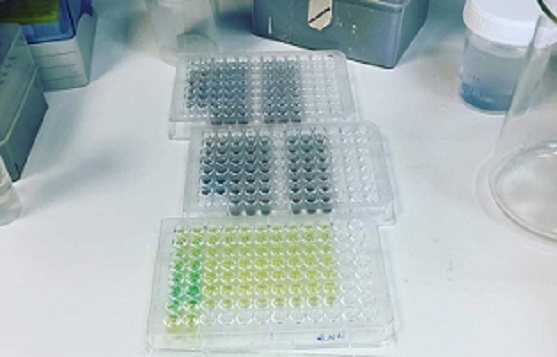Descripción
![]()
El servicio de Cuantificación Molecular de los SCIB ayuda a dar solución a muy diversos problemas durante el desarrollo de los proyectos de investigación fundamentalmente en las áreas de genética y biología celular. Este tipo de técnicas ayuda a estudiar interacciones entre macromoléculas e inmunodetección de biomarcadores. Incluyen enzimas, interacciones receptor-ligando, interacciones de baja afinidad, niveles de segundo mensajero, ADN, ARN, proteínas, interacciones proteína-proteína, péptidos, azúcares y moléculas pequeñas.
Aplicaciones
![]()
- Ácidos nucleicos y cuantificación de proteínas.
- Cuantificación de ADN.
- Detección para ensayos de expresión génica (GFP).
- Enzimología.
- Ensayos de expresión génica.
- Investigación de apoptosis.
- Caracterización enzimática.
- Cuantificación de biomarcadores.
- Cuantificación microbiana.
- Monitoreo de curva de crecimiento de alto rendimiento.
- Ensayos ELISA.
Equipamiento
![]()
Fluorímetro Luminómetro y Espectrofotómetro de placa Synergy MX Biotek.
Lector de microplacas, con capacidad de multi-detección (espectrofotómetro, fluorímetro y luminómetro).
Alphalisa PerkinElmer
Los ensayos AlphaLISA son inmunoensayos homogéneos sin lavado con alta sensibilidad y amplios rangos dinámicos. Los ensayos AlphaLISA son versátiles y se pueden usar para detectar analitos secretados, intracelulares o unidos a la membrana.
Bioplex®200 System.Biorad.
El sistema Bio-Plex 200 es un sistema que ofrece a los investigadores de proteínas y ácidos nucleicos una solución confiable de análisis multiplex que permite el análisis de hasta 100 biomoléculas en una sola muestra.
Bioplex pro II wash Station. Biorad.
Estación de lavado de microplacas para ensayos basados en perlas magnéticas, incluye soporte de placa magnética, botella de desechos, 2 botellas de líquido.
Chemidoc.Touch Imaging System.
El Bio-Rad ChemiDoc Touch y el software nos permiten reducir el tiempo que lleva analizar las proteínas en nuestras muestras desde un estudio de varios días a solo unas pocas horas. El sistema de imágenes táctiles ChemiDoc es para imágenes en gel y Western blot.
Contacto
![]()
Edificio Andrés Segovia (C/. Doctor Marañón, 3 – 11002 (Cádiz))
https://scics.uca.es/


